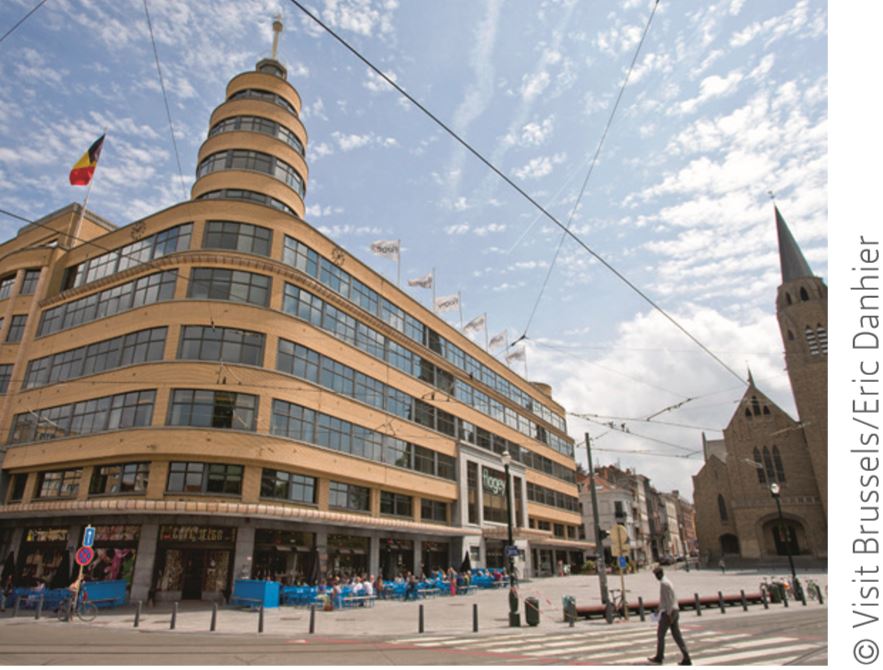- Daily & Weekly newsletters
- Buy & download The Bulletin
- Comment on our articles
My Brussels: Sven Gatz on why his city is often misunderstood
Sven Gatz left his role as director of the Belgian Brewers union to return to politics in 2014, becoming minister of culture, media, youth and Brussels policy in the Flemish government. Born in Molenbeek, he has lived in Brussels all his life. He has just published a novel about the March 2016 terrorist attacks.
What do you like so much about living in Brussels?
That we turn disadvantages into advantages. We’re not as ‘self-aware’ as people who live in Amsterdam, for instance; we aren’t as loud – or as proud – as all that. Sometimes that’s a handicap, but sometimes that can be a good thing, this self-criticism, self-derision. I think this has to do with Brussels not being heterogenous. There are so many ‘centres’ to this city. It’s difficult to get a handle on it because it’s fractured, segregated. It’s only after a few months of living here that you begin to see all the good things about these very different neighbourhoods.
The Flemish complain that you can’t speak Dutch in Brussels…
Most of the time, in a short conversation, it’s not a problem to speak Dutch. But if your expectations are that you should be helped in a shop or a cafe the same way as you are in Ghent or in Antwerp, you will be frustrated. But you can find middle ground. A study recently found that, while the quality of Dutch in Brussels is decreasing, the number of people actually speaking it is increasing. They are trying to use Dutch, as well as other languages, and that’s good enough for me.
Twenty years ago, it was much more difficult. Speaking Dutch in a shop or bar was almost a political statement. You could actually get into an argument. This kind of tension has almost totally disappeared. So if you are relaxed about that Flemish-ness or Dutch-ness, things can go really well for you in this city.
Brussels is different from the rest of the country, though, you can’t argue with that
Brussels is different from the rest of Belgium, as New York is from the rest of the United States. But I would say if you go to Copenhagen or Hamburg or Paris, you see the same thing. We only began to realise this 10 or 15 years ago. This is one of the reasons I wrote this book.
The book recounts the attacks of 22 March 2016. How does that relate to Brussels being different from the rest of Belgium?
Recently, headlines revealed that people with a migration or expat background were in the majority in Antwerp. And I thought, OK, now they are where we were 20 years ago in Brussels. Every city has to figure out how to deal with this. But that’s just the way the world turns. If it bothered me, I would have left Brussels a long time ago.
And many of my friends did. At first I was really sad about that, but now there is a large number of people who live here because they want to experience that specific kind of urban-ness. Most of time, it’s a good thing. But sometimes it complicates things because it’s seen as a city that the rest of the country cannot understand.
Lots of Flemish people don’t see Brussels as their capital because they don’t understand it, but what they forget is that Wallonia also sees it that way. It’s always the ‘other’ that we forget about, and that’s why I wrote this book from multiple perspectives. This is the new normal. And it’s not about saying what people should do or follow or how they should be happy. It’s about an acceptance of being happy with the new normal, because it’s just fine, too.

Sven’s best of Brussels
Marché aux Grains
When I come into downtown Brussels, I always end up here sooner or later. It’s very lively with a lot of nice restaurants and cafes. It’s in the heart of the city but still feels very folky.
Flagey
This is an area of great urban renewal, the Flagey building, square and ponds. Fifteen years ago, it was a dead neighbourhood. Now it feels like Café Belga has always been there. I love to stroll around this whole area.
Le Central
This is where I come to eat and drink in my home commune, Jette. It’s an old-school Belgian brasserie. I like all kinds of cafes, but my favourite are the brown cafes that have looked more or less the same for over 200 years. When it comes to beer and cafes, I’m quite a simple guy.
Kanal Centre Pompidou (currently closed for renovation works)
I’ve been taking the tram past the Citroën building since I was a kid. It’s so beautiful, with its Art Deco elements and foray into modernism. This was a period with vision, time and money to put into industrial buildings. It would be a shame to change the architectural integrity too much. The collection is great, but the real star is the building.
Top photo: Studio Nunu. This article first appeared in The Bulletin spring 2019. Molenbeek/Maalbeek: A Brussels Tale is on sale now in English, French and Dutch




















Comments
Old Grain Market or New Grain Market?